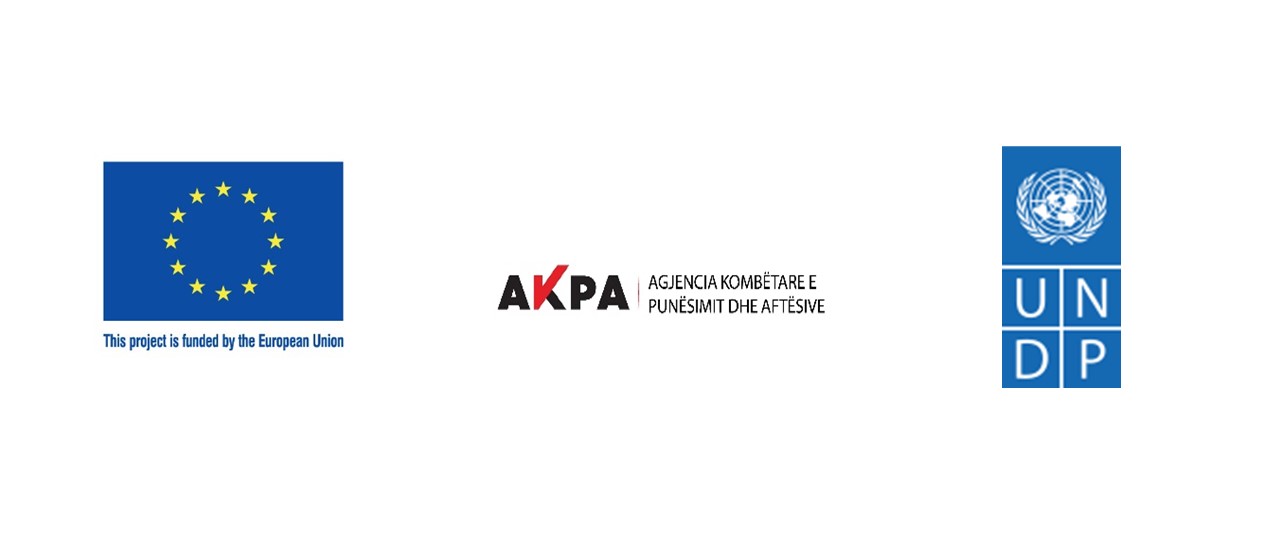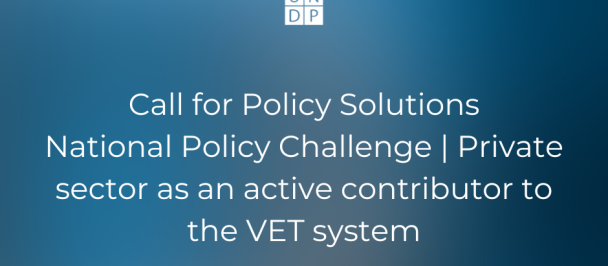Supported Continuous Unemployed Learning
SUPPORT CONTINOUS UNEMPLOYED LEARNING
WHAT IS THE PROGRAMME ABOUT
The “Supported Continuous Unemployed Learning” (SCUL) project, financed by the European Union Programme for Employment and Social Innovation (EaSI), implemented jointly by the National Agency for Employment and Skills and UNDP Albania, aims to contribute to the active participation of vulnerable low qualified jobseekers to the society and their transition to the labour market through the provision of quality, flexible, targeted trainings on basic skills. The project lead institution is the NAES given that it manages both the employment offices, hence it is in direct contact with unemployed jobseekers. The action is fully in line with the National Employment and Skills Strategy (NESS 2019-2022), the long-term programmatic document with which the government of Albania committed towards its citizens in promoting sustainable growth through social and economic inclusion.
The action is expected to have an impact on the literacy ratio in Albania (99.03[4] in 2018) for participants aged 25-64. The ambition of this intervention is to establish a structure and enhance the capacities to address the specific needs of the target group, building on which, hopefully, trigger systemic upskilling mechanisms in the longer term, progressively reducing the size of the group. The intervention aims to achieve the following outputs:
Output 1: Vulnerable jobseekers are referred to tailored basic learning provision or other social services.
Output 2: Low skilled job seekers benefitted from quality, flexible, targeted trainings on basic skills.
Output 3: Training provision is constantly improved based on collected evidence.
Who are the programme beneficiaries?
· INSTITUTIONS (MoFE, NAES, NAVETQ)
The action is expected to impact in the achievement of NAES strategic objectives responds to the EU recommendations of addressing discrimination against minorities and vulnerable groups.
Improve staff’s professional capacities and skills through the training sessions of the action (training of trainer’s approach)
Establishment of new structure delivered under the project aiming support the target group’ s integration in the labour market.
The deliverables provided under the project lead to the establishment of a structure to support systematically the target group.
The directed provision of training responding the institution’s needs is expected to build an integrated case management system.
TARGET GROUP- Low Skilled Jobseekers
Impacts directly the target group (around 6000 low-skilled jobseekers) acquiring basic professional and personal skills and capacities, namely, (i)literacy and numeracy, (ii) basic digital skills.
Supports and facilitate the access and transition of the target group in the labour market and additional vocational education.
Active participation of vulnerable low qualified jobseekers to the society.
Expected Results
A map of sub-categories of unemployed jobseekers is identified.
6000 low-qualified job seekers are assessed in the skills they possess.
Protocols for specific sub-groups are developed, resulting in an enlarged portfolio of services provided to low-educated individuals.
15 teachers/instructors are trained and possess the competencies to teach to adults.
900 low-educated/qualified adults benefitted of tailored, quality, flexible trainings on basic skills and 60 training modules are delivered.
Detailed information on registered low-educated jobseekers is continuously extracted thanks to the profiling system, allowing informed decision making in training needs.
A roadmap is designed to address the learning needs of other vulnerable target groups (adult jobseekers not having completed upper secondary education, some other 27,000 people.
Policy Themes – SCUL Project
1. First principal of European Pillar of Social Rights, which states that “everyone has the right to quality and inclusive education, training and life-long learning in order to maintain and acquire skills that enable people to participate fully in society and successfully manage transitions in the labour market”[1]. The Recommendation also contributes to achieving the UN Sustainable Development Goal 4 9, of ensuring that by 2030 all youth and a substantial proportion of adults, both men and women, achieve literacy and numeracy. The action is following the 3 steps approach presented in the updated recommendation: 1) Assessing skills; 2) Tailored learning offer; 3) Validation and recognition.
1. This intervention is fully in line with the National Employment and Skills Strategy renewed for 2019 -2022 whose overall goal is to promote quality jobs and skills opportunities for all Albanian women and men through their lifecycle. The intervention streamlines 3 pillars of the strategy, namely Pillar C - promote social inclusion and territorial cohesion which requires great commitment currently; Pillar B - Offer quality vocational education and training to youth and adults and Pillar D - Strengthen the governance of the labour market and the qualifications system. Also, the action is expected to impact in the achievement of NAES strategic objectives responding to the EU recommendations and accession-related commitments
2. The implementation of SCUL project will also contribute to expanding the range of stakeholders involved in advancement of life-long learning in Albania (adult learning and their successful transition to employment); tackling different governing levels: local, regional, national, and creating synergies with EU actions. This is addressed by the work of project steering committee in planning meetings as well as through stakeholder consultations, conferences, and other frequent smaller scale activities.
3. Considering that SCUL employs customized, and tailored techniques in promoting continuous adult learning, it will also provide important input to redesigning ALMPs, improving in this way the individual jobseeker-centered approach and better target vulnerable sub-categories. The dissemination of results and recommendations issued by statistical, qualitative analysis, skills assessment and ex-post evaluation carried out through the project, will supply continuously consultations held at the EU level policy. This is done in cooperation with NAVETQ which is part of the project Steering Committee but also the coordination point in EU platform namely, European Platform for Adult Learning and Education (EPALE). Nationally, NAVETQ is the public institution responsible for the inclusion of life - long learning in Albanian Qualification Framework through development, revision of the AQF leaning on the European Qualification Framework. It also monitors together with other actors the operationalization of the new bylaws and amendments approaching adult/life-long learning. Life-long learning is integrated in the AQF only recently; Reference to the Law No.23/2018. DCM No. 427 26.06.2019, therefore it requires frequent monitoring and extended efforts to increase and diversify the offer of adult learning qualifications courses within the national framework.
4. The intervention is linked with the renewed European Agenda on adult learning up to 2020 and the third Riga Conclusion "Enhance access to VET and qualifications for all through more flexible and permeable systems, notably by offering efficient and integrated guidance services and making available validation of non-formal and informal learning".
5. Enhancing basic digital skills and developing digital curricula in adult learning stands at the core of this intervention. Thus, it highlights the importance of digital learning which expectantly will boost digitalization strategies of Albanian education and employment system in the national scale.

 Locations
Locations





